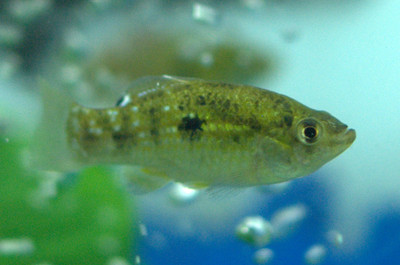The American Flagfish: A Vibrant Icon of Native Aquatic Life
Posted by Max Gandara on on 12th Oct 2023
The American Flagfish (Jordanella floridae) is a strikingly colorful and
unique species of fish native to North America, particularly found in
the southeastern United States. Named for the male's resemblance to the
American flag, this vibrant freshwater fish is a favorite among
aquarists for its stunning appearance and relatively easy care
requirements. In this article, we will delve into the fascinating world
of the American Flagfish, exploring its natural habitat, physical
characteristics, behavior, care, and conservation efforts.
American Flagfish are primarily found in the slow-moving waters of the
Florida Peninsula, including swamps, marshes, and shallow ponds. They
have also been observed in Georgia and South Carolina. These habitats
are often densely vegetated with submerged and emergent plants, which
the Flagfish use for cover and foraging. The waters they inhabit are
typically warm, ranging from 70°F to 85°F (21°C to 29°C).
1. Striking Coloration: The American Flagfish is known for its stunning
coloration, especially in males. They have a bold pattern of alternating
red, blue, and yellow stripes that resembles the American flag, giving
them their common name. Females are generally less colorful and exhibit a
more subdued pattern.
2. Size: These fish are relatively small, with adults reaching an average length of 2 to 2.5 inches (5 to 6.5 cm).
3. Unique Fins: They have elongated dorsal and anal fins, with the
male's dorsal fin having more intense colors and elongated filaments.
These fins are used for courtship displays.
1. Territorial Nature: American Flagfish can be territorial and are best
kept in a species-specific tank or with peaceful tank mates. Males may
occasionally display aggression towards each other, especially during
the breeding season.
2. Feeding: They are omnivorous and feed on a variety of foods,
including algae, small invertebrates, and aquatic plants. In an
aquarium, they can be fed a diet of high-quality flake food, live or
frozen brine shrimp, and spirulina-based pellets.
3. Breeding: Breeding American Flagfish can be a rewarding experience.
Males will create bubble nests under plant leaves, where they entice
females to lay their eggs. After the eggs hatch, males will guard the
fry.
To provide proper care for American Flagfish, it's essential to
replicate their natural habitat as closely as possible. Here are some
care guidelines:
1. Tank Size: A 10-gallon tank is sufficient for a small group of Flagfish.
2. Water Parameters: Maintain a temperature between 75°F and 82°F (24°C
to 28°C) and a pH level between 6.5 and 8.0. They prefer slightly
alkaline water.
3. Filtration: Ensure good filtration and regular water changes to maintain water quality.
4. Vegetation: Provide plenty of aquatic plants for cover and grazing.
Flagfish are herbivorous and enjoy nibbling on plant matter.
American Flagfish are not currently considered an endangered species,
but their natural habitat is threatened by pollution and habitat
destruction. Conservationists emphasize the importance of preserving
their native ecosystems and maintaining the genetic diversity of this
species to ensure its long-term survival.
The American Flagfish is a captivating species with its patriotic colors
and intriguing behaviors. It's a fantastic addition to freshwater
aquariums, but it's vital to provide them with the right environment and
care. Their striking appearance and natural history make them a symbol
of the beauty of native North American aquatic life, emphasizing the
importance of preserving their habitats for future generations to
appreciate.

